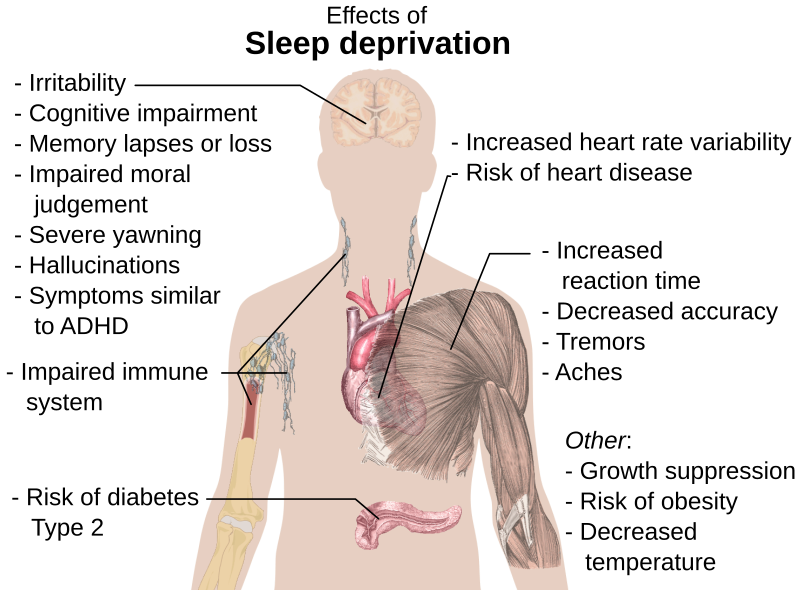It's The Little Things That Make Life Big
Sleep impecuniousness is pretty common these days—information technology'due south a major attribute of accomplishment-oriented societies—only why would anyone take a love-hate relationship with information technology? Usually, i would say,sleep deprivation and all the accompanying symptomsare the definition of a honey-detest human relationship, to the core.
Allow me tell you something: yous canuse slumber deprivation for your ain do good. We'll get into how this works, just beginning, let'due south talk over the miracle of slumber, sleep impecuniousness and its symptoms, and finally pattern a "how to" experiment about sleep impecuniousness(commonly known as self-torture), and ask ourselves, more than chiefly, why?
Sleep: Functionality
"Slumber is a naturally recurring state characterized by reduced or absent-minded consciousness, […] and inactivity of almost all voluntary muscles." (Macmillan, 1981). This is a short and clear explanation:
- slumber is characterized by sleep stages/cycles (v cycles, differing in depth)
- the deeper your sleep, the improve the quality of sleep
- More than Sleep ≠ Better (healthy avg. seven.five-9 hours)
The functions of sleep are very multifaceted and majorly unexplored, just these (validated, and commonly accepted) aspects interest us the almost right now. Sleep has a major impact:
- on our memory and the power to re-organize thoughts, experiences and to learn new things (neuroplasticity)
- on the regulation of necessary hormones and the ability of our body to regenerate physically
What is Sleep Deprivation?
Sleep deprivation is the lack of sleep: either it was caused past a very superficial and brusk slumber (over a period of some days) or by no sleep at all. The functionality and benefits of slumber are limited equally a result (encounter above), and we might face someserious bug, if we stay sleep-deprived for a prolonged period of time.
The effects of sleep deprivation are various; some occur instantly afteracute deprivation, other occur only afterchronic impecuniousness:

(by Mikael Häggström, Wikimedia Eatables, 2009)
After acute deprivation:
- irritability
- cerebral impairment
- memory lapses
- restricted sentence
- severe yawning
- increased heart-rate variability, increased reaction time and decreased accuracy
- temporary emotional instability
After chronic deprivation:
The effects of chronic deprivation boil down to the development of various diseases, such as:
- Diabetes
- centre disease
- growth suppression
- restricted immune system functionality
- weight gain/loss
- depression
Due to the diversity of acute deficits, sleep deprivation has been used equally a successful interrogation technique. In fact, the U.S. military authorised slumber deprivation as an interrogation method (Go out no Marks: Enhanced Interrogation Techniques and the Risk of Criminality, August 2007).
Simply hey, why would there be ahoney-hate relationship here? What'southward the benefit for united states?!
How To (..and the benefits of sleep impecuniousness?!)
The effects of sleep deprivation on the human torso were observed and analyzed in the 70s: the methodological monitoring involved blood analysis, but likewise neuropsychological instruments to capture the brain activeness during slumber-deprivation and duringrecovery sleep after impecuniousness.
The results:"There'south testify of antidepressive outcome after slumber deprivation."As a thing of fact, subjects experienced a37.ii % improvement in their mood!
The background of these results are various—the reasons behind the remarkable mood improvement are, amid others:
- biochemical investigations proved an increment of unlike hormones, including serotonin and noradrenaline, which are also known to officeas a happiness hormone (serotonin) and stimulating hormone (noradrenaline)
- improved sleep continuity and depth in the night after sleep deprivation
These mentioned furnishings take action in depressedmerely too non-depressed people,meaning that yous can stay awake for a night, brainstorm the adjacent day as you usually do and try to keep yourself awake (that'due south not very like shooting fish in a barrel!) and go to bed quite early → sleep similar a baby → wake upwardly the next morn withmore than power and free energy.
By depriving yourself of sleep, youprepare your biological clock to zilch— in case your time management is messed up and running out of fuel, this can very helpful (a beloved-detest relationship). You tin can call sleep deprivationsleephacking: at commencement we abstain from sleep, and later (during the recovery nighttime) we slip into a very deep state of sleep, which will regenerate us.
Absolutely, slumber deprivation among healthy people is ofttimes met with skepticism, mainly because healthy subjects tin regulate their slumber design in other ways (through nutrition, sleep hygiene and sleep rituals). On the other mitt, sleep deprivation is free of whatever serious side effects and tin can serve as a quick set. Here'due south a short how-to:
- Perform your sleep deprivation "experiment" on the weekend (working in a slumber deprived state tin exist difficult)
- Proceed yourself awake during your slumber deprivation night (and the following day) with the help of tea or coffee, but delight don't overdo it
- Go to bed early on on your sleep-deprived day, and savour your deep recovery dark (vii.five – ix hours)
- Wake up powerful and energized, feeling similar a million dollars
Later on your sleep impecuniousness experiment you should take care of a well-counterbalanced diet and proficient sleeping habits—do not regress to old, negative tendencies. Sleep deprivation for a nighttime tin can be applied easily, is highly constructive and free of serious side effects. Take you already tried it? Share your experience with us!
Featured photograph credit: Lux Graves via unsplash.com
Source: https://www.lifehack.org/articles/lifestyle/its-the-little-things-that-make-life-big.html
0 Response to "It's The Little Things That Make Life Big"
Postar um comentário